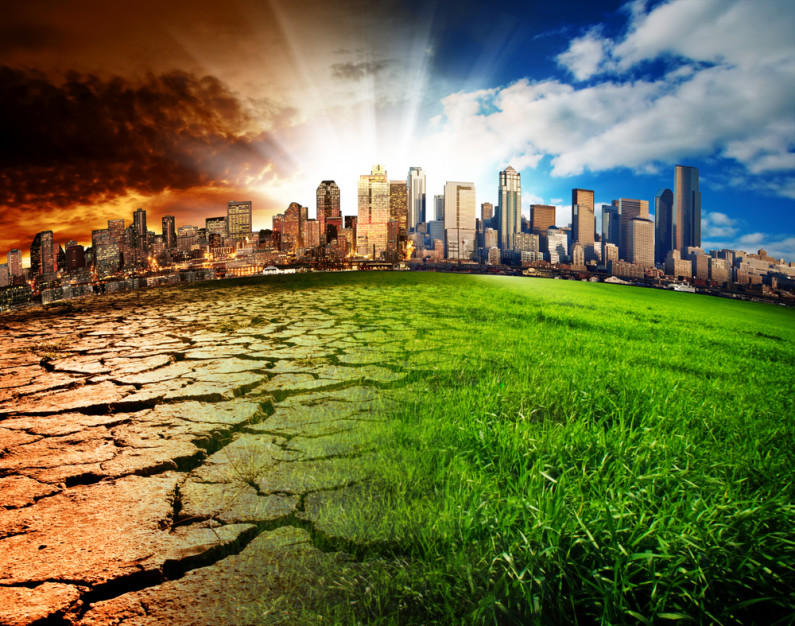
As the ‘Climate Risk Profile’ of Ethiopia highlights, “climate change will have key impacts on agriculture, livestock, water and human health in Ethiopia.” As a country whose economy is dependent on the agriculture sector and one of the world’s most drought-prone countries, the implications of climate change to its economy is dire.
Climate change has become one of the pressing problems worldwide as it affects socio-economic activities, agriculture being one of the most vulnerable sectors. And the reason we need to fight climate change is because the problems that come because of it are increasing, says Dr. Degefe Tibebe, environment/ forest and water expert. “It is troubling our economic and social lives.”
As to Dr. Hassan Beshir, an economist, environmental shock may bring unexpected drought and reduced rainfall, and this means huge problem since Ethiopia’s economy is rainfall-dependent. Agriculture production decreases means it creates huge pressure on the country’s economy.
Not only that. But its potential to exact economic cost due to destroyed infrastructures as a result of extreme weather cannot be underestimated. So much so, some of the world’s most influential economists has called for a tax on carbon emissions in the developed world, saying climate change demands “immediate national action.”
International solidarity and unkept promises
I believe, says Dr. Degefe, every nation and every segment of the world’s population up until the individual level should be part of this effort to mitigate climate change.
There are major conventions and agreements on climate change, like the Paris agreement that tried to solve the issue as much as possible. However, the wealthy nations that pledged to help the poorest, are not fully delivering.
Nevertheless, he argues, developing countries should do what is necessary to mitigate the impact that may befall upon them as a result of climate change because they cannot afford to sit idly. The economy of many developing countries is based upon agriculture, so they will have to have their own efforts to mitigate the impact.
Also, developing, poor countries should collaborate and convince the rest of the word how they are impacted though various scientific evidence, and find ways to make sure the wealthy countries deliver on their commitments. “It is a situation where science and politics can solve in collaboration.”
While much better outcome may come out of it, what is expected of the developing world is to move forward, and not move backward saying that the pledged contribution did not come, because they cannot afford to do so. And truth be told, he continued, although it is pivotal that the industrialized world keep their words and pledge and improve the financial mobilization of climate finance, they still need to come up with a strategy to help mitigate the impact by their own effort.
Ethiopia’s green economy
In Ethiopia, there are efforts waged by the government to reduce greenhouse gas emissions while safeguarding economic growth through a green economy strategy. Six sectors of the economy most vulnerable to the hazards of climate change have been identified for prioritized regional adaptation plans: agriculture, health, water and energy, buildings, and transport.
For instance, the decision in the transport sector to construct an electric railway, or build hydroelectric power in the energy sector is a strategic decision in linkage with its green economy strategy. “Also, the effort to come up with climate change adaption technologies in the agriculture sector is part of this strategic decision.”
And according to Dr. Hassan, although there needs to be a thorough scientific study made in order to understand and assess the depth of the result the document has brought, in general, Ethiopia’s green economy policy is good, especially the works done on afforestation and soil and water conservation are good.
While already mentioning how its dependence on its rain-fed agriculture economy is most vulnerable to environmental shock, he makes the point that there need to be huge investment made on irrigation to address the issue of dependence on rain-fed farming and low level of irrigation.
Historically, irrigation has been the most crucial input when it comes to increasing agricultural productivity.
Given that agriculture plays crucial role in the process of economic development of Ethiopia, it makes irrigation very essential topic for the country. And there needs to be an effort to transform from rain-dependent to a one with expanded use of irrigation by using the small farms of farmers and by increasing awareness of the farmers on irrigation.
Economic implications
To Dr. Hassan, in order to mitigate climate change, work should also be done on the economy, as its growth is crucial. It should be weighed by production growth, and so in order for production to soar, the economy should be stable.
He points out that low supply of food as a result of climate change effects means there is no consumption, which in turn means it will not be good for the economy. It affects income and welfare of households.
This shared by Ashenafi Belayneh, who wrote a seminal research paper on the issue, and stated that climate change does not only result in macroeconomic and sectoral repercussions but also affects income and welfare of households.
According to him, the effect of climate change is going to be exacerbated with future changes in climate, and there is a need to counteract these impacts, especially on agricultural production by taking improved adaptation actions at the farm level.
While it is not an easy sell to connect the effects of climate change and the economy, it is obvious enough that the government should consider scaling up the existing ones and designing and implementing new adaptation mechanisms uniformly to reduce the harmful effects of climate change. After all, developing country like Ethiopia cannot afford to sit by idly.
The Ethiopian Herald May 20/2020
BY STAFF REPORTER




